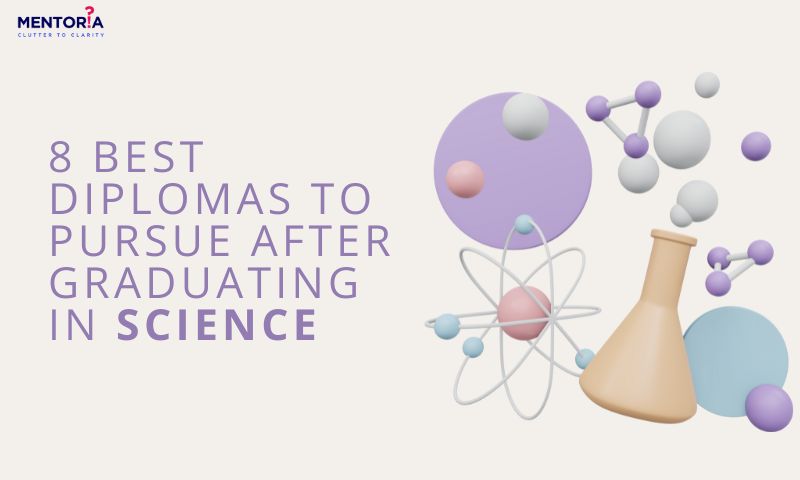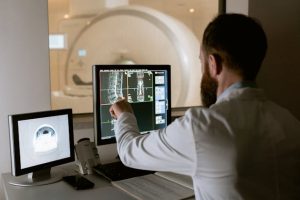8 Best Diplomas To Pursue After Graduating In Science

Jump to Section
Are you a science student who recently finished 12th grade? Are you interested in pursuing a career in science but unsure about which path to choose? Well, here’s an idea you might find helpful – why not consider enrolling in a diploma course?
Following your 12th grade in science, a diploma programme is intended to give you advanced knowledge and useful skills in the topic of your choice. Diploma programmes can be finished in one to three years and have a shorter duration than standard degree programmes. They are an excellent option for students who prefer hands-on learning over theoretical knowledge because they also place a greater emphasis on practical training.
Moreover, numerous diploma programmes establish collaborations with industries and provide internships, allowing you to acquire practical skills and establish connections with potential employers.
In this article, let’s dive into the best diploma courses that provide amazing opportunities. Moreover, we’ll dig into the details of each course and grasp the significance and requirements of diplomas. Let’s get started!
Reasons Why Diplomas Are Better Than Degrees
- Diploma courses are focused on the industry: Most diploma courses cut to the chase and prioritise practical experience. They focus on developing essential skills that will be valuable in your future career.
- A professional diploma can lead to higher earnings: The diploma programme is designed to equip students with practical skills and knowledge applicable in the real world. As a result, professional diplomas can help individuals earn a better income after completing the course. It can also assist in enhancing one’s current salary package.
- Admission requirements for diploma programmes are more flexible: Typically, degrees have strict admission criteria such as specific age or high grade requirements. Consequently, the chances of admission are lower if one doesn’t meet their eligibility criteria. Diploma programmes are less reliant on these restrictions, providing a better opportunity for acceptance based on personal choice.
- Diploma programmes are not as long as college degrees: Unlike college degrees, which usually take four years to complete, diploma programmes are shorter and more focused. Typically lasting one to two years, these programmes prepare individuals to enter the job market sooner. They provide valuable knowledge about the latest industrial technologies and trends.
- Diploma courses provide a flexible option for students: Unlike degree courses, they have a smaller number of subjects to study, making it easier for working students to pursue part-time diploma courses. Diplomas are less stressful compared to degrees as they involve fewer subjects and theory to learn and master. Additionally, many diploma courses offer the convenience of online learning.
- Diploma courses are more affordable compared to degree programmes: A lot of people opt out of pursuing a degree because of the expensive tuition fees. Those who have limited financial resources often rely on scholarships to gain entry into colleges and universities. On the other hand, diploma courses are a much cheaper alternative and require less time to complete than a traditional degree.
Let’s now talk about the best diploma courses.
Diploma In Clinical Research
A Clinical Research Diploma is all about understanding the ins and outs of conducting clinical trials and research studies for medical treatments. In this programme, you’ll learn how to plan, oversee, and evaluate trials that examine new drugs, therapies, or medical devices. The coursework usually covers important areas like research ethics, following regulations, managing data, and the different stages of clinical trials. By completing this diploma, you’ll be well-prepared for positions in the pharmaceutical, biotechnology, and healthcare sectors, where you can make valuable contributions to the creation of safe and efficient medical interventions.
What You’ll Study
- Clinical Trial Design: Understanding how to plan and structure clinical trials, including considerations for participant selection, ethical guidelines, and research objectives.
- Research Ethics And Regulations: Discovering the moral guidelines and regulatory structures that oversee clinical research, guaranteeing the safeguarding of participants and upholding the study’s integrity.
- Data Collection And Management: Learning methods for gathering and organising data obtained during clinical trials, emphasising accuracy, confidentiality, and adherence to protocols.
- Statistical Analysis: Developing skills in statistical techniques to analyse and interpret the data collected during clinical trials, aiding in drawing meaningful conclusions.
- Drug Development Process: Gaining insights into the various phases of drug development, from preclinical testing to post-marketing surveillance, and understanding the roles of different stakeholders in the process.
Important Details About The Diploma
-
- Duration: 10-12 Months
- Course Fee: INR 50,000 Annually
- Average Starting Salary: INR 2,50,000- INR 5,00,000 per Annum
- Job Roles: Pharmaceuticals, Clinical Research Associates, Clinical Research Physicians, Lecturer, Clinical Research Coordinator, Biostatistician, Clinical Research Analyst etc.
- Top Colleges: ICRI, Mumbai; IGMPI, Noida; ICRI, New Delhi; ICRI Bangalore; Bioinformatics Institute of India(BIT), Noida.
Diploma In Biotechnology
A Diploma in Biotechnology teaches you how to use living organisms, cells, and biological systems to create new products and technologies. It’s like a toolkit for manipulating genes and cells to develop things like medicines, genetically modified crops, or improved industrial processes. This diploma covers the basics of genetic engineering, molecular biology, and other techniques that open up exciting possibilities in fields like medicine, agriculture, and industry.
What You’ll Study
In a Diploma in Biotechnology, you’ll study:
- Genetic Engineering: Delving into the manipulation of genes to create new traits or modify living organisms for beneficial purposes, like enhancing crop resistance or producing medicines.
- Microbiology Basics: Understanding the world of microorganisms, like bacteria and fungi, and how they can be harnessed for various biotechnological applications.
- Cell Culture Techniques: Learning how to grow and maintain cells outside their natural environment is a crucial skill for producing things like vaccines or studying cellular behaviour.
- Bioprocessing: Exploring the methods to scale up biotechnological processes for large-scale production, such as the fermentation of microorganisms to create useful products.
- Bioinformatics: Introducing the use of computer science and information technology to analyse biological data, aiding in tasks like gene sequencing and understanding complex biological systems.
Important Details About The Diploma
-
- Duration: 1 Year
- Course Fee: INR 3,500 to INR 44,000
- Average Starting Salary: INR 3 – 20 LPA.
- Job Roles: Lab Analyst, Research Analyst, Lab Assistant, Biotechnologist, Safety Specialist, Research Scientist etc.
- Top colleges: Parul University, Vadodara; Rajshree Institute of Management and Technology, Bareilly; Techno India University, Kolkata; University of Mumbai [MU], Mumbai.
Diploma In Food Technology
A Diploma in Food Technology is all about understanding how to make our food safe, delicious, and innovative. It involves learning the science and technology behind food processing, preservation, and quality control. From designing new food products to ensuring they meet health standards, this diploma equips you with the skills to work in the food industry. You’ll explore areas like food chemistry, microbiology, and processing techniques to contribute to creating and maintaining the tasty and safe food we enjoy every day.
What You’ll Study
In a Diploma in Food Technology you’ll study:
- Food Chemistry: Understanding the components of food, their reactions during cooking or processing, and how different ingredients contribute to taste, texture, and nutritional value.
- Food Processing Techniques: Learning methods to transform raw ingredients into finished products, including preservation methods, packaging, and quality control measures.
- Food Microbiology: Exploring the role of microorganisms in food, both beneficial and harmful, and how to ensure food safety by preventing contamination.
- Nutritional Science: Studying the nutritional content of foods and how different diets can impact health, addressing concerns like allergies or specific dietary requirements.
- Quality Assurance: Developing skills in ensuring the consistency and quality of food products, including testing and monitoring processes to meet industry standards and regulations.
This diploma provides a foundation in legal aspects crucial for effective corporate management and ensures businesses operate within the boundaries of the law.
Important Details About The Diploma
-
- Duration: 3-4 Years
- Course Fee: INR 20,000-70,000/ Year
- Average Starting Salary: INR 2,50,000-4,50,000/ Year
- Job Roles: Food Technologist, Food Processor, Food Quality Assurance Manager, Production Supervisor
- Top Colleges: National Institute of Food Technology Entrepreneurship and Management (NIFTEM), Delhi; MIT ADT University, Pune; Harcourt Butler Technical University, Kanpur; Indian Institute of Food Technology, Haryana; Laxminarayan Institute of Technology, Nagpur; Jamia Hamdard University, Delhi; Gautam Buddha University, Greater Noida; Lovely Professional University, Chandigarh.
Diploma In Forensic Science
For a Diploma in Forensic Science, is similar to being a scientific sleuth. It educates you on utilising scientific approaches to probe crimes and scrutinise evidence. You’ll gain knowledge about gathering and scrutinising items such as fingerprints, blood, and DNA to unravel enigmas. This diploma encompasses a range of forensic methods, including toxicology, ballistics, and crime scene investigation. It equips you to contribute to law enforcement by aiding in crime resolution and ensuring that justice is served through scientific proof.
What You’ll Study
In a Diploma in Forensic Science you’ll study:
- Crime Scene Investigation: Learning how to collect and analyse physical evidence from crime scenes, ranging from fingerprints to DNA samples.
- Forensic Chemistry: Understanding how to identify and analyse substances, such as drugs or toxins, that are relevant to criminal investigations.
- Digital Forensics: Exploring methods to recover, analyse, and preserve digital evidence, including data from computers and other electronic devices.
- Forensic Pathology: Studying the science of examining bodies to determine the cause and manner of death, helping solve crimes, and understanding the circumstances surrounding fatalities.
- Forensic Psychology: Investigating the intersection of psychology and law, including profiling and understanding the behaviour of individuals involved in criminal activities.
Important Details About The Diploma
-
- Duration: 1 Year
- Course Fee: INR 27,500
- Average Starting Salary: INR 3-15 LPA
- Job Roles: Crime scene Examiner, Forensic Pathologist, Crime Laboratory Analyst, Forensic IT Specialist, Forensic Psychologist, Cyber Consultant, Research Assistant, Security Auditor, Network Administrator, Cyber Advisor, Forensic Medical Examiner, Forensic Accountant.
- Top Colleges: Banaras Hindu University, Varanasi; Bundelkhand University, Jhansi; SGT University, Gurgaon; RIMT University, Gobindgarh; Starex University, Gurgaon; Himalayan University, Itanagar; Saurashtra University, Rajkot; Jiwaji University, Gwalior; Maharaja Ganga Singh University, Bikaner; Adarsh India Technical and Paramedical College, Muzaffarpur.
Diploma In Pharmaceutical Management
A Pharmaceutical Management Diploma is all about the business and managerial side of the pharmaceutical industry. It gives people the necessary skills to effectively handle and improve different processes in the production, distribution, and marketing of pharmaceutical products. Students learn about pharmaceutical regulations, quality control, supply chain management, and marketing strategies tailored for the healthcare sector. This diploma prepares professionals to successfully navigate the challenging landscape of the pharmaceutical industry, ensuring that pharmaceutical companies and healthcare organisations are managed efficiently and ethically.
What You’ll Study
In a Diploma in Pharmaceutical Management, you’ll study:
- Regulatory Compliance: Understanding the complex regulations and standards governing the pharmaceutical industry to ensure products meet quality and safety requirements.
- Supply Chain Management: Learning how to efficiently handle the production, distribution, and logistics of pharmaceutical products from manufacturing facilities to end-users.
- Pharmaceutical Marketing: Exploring strategies to promote and sell pharmaceutical products, including market research, advertising, and understanding consumer needs.
- Quality Control: Developing skills in maintaining and assuring the quality of pharmaceutical products through rigorous testing and adherence to industry standards.
- Healthcare Economics: Understanding the economic aspects of the pharmaceutical sector, including pricing strategies, market dynamics, and the impact of healthcare policies on the industry.
This diploma provides a strong foundation in managing and optimising financial aspects, ensuring the financial health and success of a business.
Important Details About The Diploma
-
- Duration: 1 Year
- Course Fee: INR 10K to 25 Lacs
- Average Starting Salary: INR 1 to 15 Lacs
- Job Roles: Sales Manager, Drug Cost Accountant, Drug Distribution Manager, Sales & Marketing Manager, Pharmaceuticals Distributor, Self-Marketer, Market Researcher and Drug Developer
- Top Colleges: SIES College of Management Studies, Mumbai; Rayat Bahra University, Mohali; Maharashtra University of Health Sciences, Nashik; Indian Institute of Pharmaceutical Marketing, Lucknow; MITCON Institute of Management, Pune.
Diploma In Nutrition And Dietetics
The Diploma in Nutrition and Dietetics is a thorough course that delves into the impact of food on our well-being. This programme provides individuals with the necessary knowledge to comprehend dietary requirements, develop well-rounded meal plans, and encourage healthy eating habits. Students gain insights into human nutrition, metabolism, and the vital role nutrients play in maintaining overall health. The curriculum covers designing nutrition plans for different health conditions, considering factors like age, lifestyle, and specific dietary requirements. Students also gain insights into food safety, cultural influences on dietary practices, and effective communication to educate others about the importance of a nutritious diet. With this diploma, graduates can work in various settings like hospitals, clinics, community health programmes, or private practice, contributing to the promotion of good health and the prevention of nutrition-related diseases.
What You’ll Study
In a Diploma in Nutrition and Dietetics, you’ll study:
- Nutritional Science: Learning about the composition of food, nutrients, and how the body processes them to maintain health.
- Dietary Planning: Developing skills to create personalised and balanced meal plans based on individual needs, considering factors like age, health conditions, and lifestyle.
- Clinical Nutrition: Exploring the relationship between nutrition and specific health conditions, and understanding how dietary interventions can support treatment.
- Food Safety and Hygiene: Studying practices to ensure the safety of food from production to consumption, preventing contamination and foodborne illnesses.
- Community Nutrition: Addressing public health aspects by studying nutritional needs at the community level, designing Programmes for promoting healthy eating habits, and preventing nutrition-related issues.
Important Details About The Diploma
-
- Duration: 1 Year
- Course Fee: INR 2000- 2 lakh per annum.
- Average Starting Salary: INR 2- 8 lakh per annum.
- Job Roles: Clinical Dietitian, Management Dietitian, Consultant Dietitian, Nutrition Research Scientist, Community Dietitian, Product Manager, Nutrition Sales Executive, Trainee Nutrition Sales Executive, etc.
- Top Colleges: St Teresa’s College, Ernakulam; Maharaja Sayajirao University of Baroda, Vadodara; Sam Higginbottom Institute of Agriculture, Technology and Sciences, Allahabad; Mahatma Jyoti Rao Phoole University, Jaipur; Parul University, Vadodara; Institute of Home Economics, New Delhi.
Diploma In Medical Transcription
A Diploma in Medical Transcription teaches you the skills to convert spoken medical information into written documents. It’s like being a bridge between healthcare professionals and accurate medical records. In this programme, you’ll learn how to listen to recorded medical dictations from doctors and other healthcare providers and then accurately transcribe them into written reports. This ensures that patient histories, diagnoses, and treatments are well-documented for proper healthcare management. It plays a crucial role in maintaining organised and precise medical records, contributing to effective communication among healthcare professionals and quality patient care.
What You’ll Study
In a Diploma in Medical Transcription, you’ll study:
- Medical Terminology: Learning the specific language used in healthcare to accurately transcribe medical documents and ensure precision.
- Transcription Techniques: Developing proficiency in converting dictated medical information, such as patient histories and treatment plans, into written form.
- Technology in Transcription: Understanding and using specialised software and equipment to enhance efficiency and accuracy in the transcription process.
- Anatomy and Physiology: Gaining knowledge of the structure and functions of the human body to accurately transcribe medical information related to specific anatomical areas.
- Legal and Ethical Considerations: Exploring the legal and ethical aspects of handling sensitive medical information, maintaining patient confidentiality, and complying with healthcare regulations.
Important Details About The Diploma
-
- Duration: 1 Years
- Course Fee: INR 7000 – 35,000 per annum
- Average Starting Salary: 2 lakh-7 lakh per annum
- Job Roles: Medical Transcriptionist, Medical Records and Health Information Technicians, Information Clerks, Medical Assistants, Court Reporters, Interpreters and Translators, Medical Summariser.
- Top Colleges: Astron Institute of International Studies, Gurugram; Global Institute of Health Science(Online).
Diploma In Medical Imaging Technology
A Diploma in Medical Imaging Technology is all about using advanced imaging equipment to get a clear view of what’s happening inside the human body. It’s like becoming an expert in X-rays, CT scans, and MRIs to help doctors figure out what’s going on with their patients. In this programme, students learn how to operate and take care of imaging equipment, understand different imaging techniques, and make sure the images are top-notch. They also study anatomy and pathology to accurately interpret the images. After completing this diploma, graduates can work in hospitals, clinics, and diagnostic imaging centres, where they play a vital role in diagnosing and monitoring various medical conditions.
What You’ll Study
In a Diploma in Medical Imaging Technology, you’ll study:
- Radiographic Imaging: Learning the principles and techniques of X-ray imaging to capture images of bones and tissues for diagnostic purposes.
- Computed Tomography (CT): Understanding how CT scans use multiple X-ray images to create detailed cross-sectional views of the body, aiding in the diagnosis of various conditions.
- Magnetic Resonance Imaging (MRI): Exploring the principles of using magnetic fields and radio waves to produce detailed images of soft tissues, organs, and structures within the body.
- Ultrasound Technology: Studying the use of high-frequency sound waves to create images, is particularly useful for visualising organs and monitoring pregnancies.
- Quality Control and Patient Care: Developing skills in ensuring the accuracy and safety of imaging equipment while also understanding how to care for patients during imaging procedures.
Important Details About The Diploma
-
- Duration: 2 Year
- Course Fee: INR 20,000-1,00,000 per annum
- Average Starting Salary: INR 10,000-10,00,000 per annum
- Job Roles: Magnetic Resonance Imaging Specialist Manufacturer, Medical Imaging Technologist, Radiology Information Specialist, Sales Representative, Sonographer, Applications Specialist for Equipment, Computed Tomography Specialist Educator, Interventional Radiology Specialist.
- Top Colleges: AIIMS Delhi; Jamia Hamdard, New Delhi; KGMU Lucknow; JIPMER Puducherry: Integral University, Lucknow; NIMS University, Jaipur; KIMS Karad.
The Next Step
A diploma programme after completing your degree can be a fantastic option for students who want to enhance their skills and knowledge in a specific field. These programmes are designed to offer practical training and hands-on experience, equipping students for the job market in a short period. There are a variety of diploma programmes available in areas such as science, arts, and commerce, enabling students to choose the one that aligns with their interests and career aspirations. Moreover, with the advent of online learning platforms, these programmes have become more accessible and flexible, making it convenient for students to pursue them. Ultimately, opting for a diploma programme after graduation can provide students with a competitive edge in the job market and unlock numerous career opportunities.
We hope we have been able to give you all the necessary information about diploma courses after graduation. But if you still have any questions, why not reach out to our industry experts? Mentoria offers a wide range of streams, over 850 courses, and insights into more than 12,000 careers. Our goal is to assist you in finding the perfect academic path. Connect with our mentors today and begin your journey towards a rewarding and successful student life.













